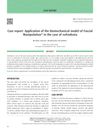 25 citations,
May 2020 in “Stem Cells Translational Medicine”
25 citations,
May 2020 in “Stem Cells Translational Medicine” ADSC-CE treatment safely increases hair density and thickness in androgenetic alopecia patients.
 21 citations,
September 2016 in “Journal of Dermatological Treatment”
21 citations,
September 2016 in “Journal of Dermatological Treatment” The new classification system for skin disorders emphasizes the importance of understanding a patient's awareness of their condition for better treatment.
 21 citations,
April 2015 in “Psychology Research and Behavior Management”
21 citations,
April 2015 in “Psychology Research and Behavior Management” Cognitive-behavioral therapy is the best treatment for hair-pulling disorder, and combining it with other therapies could improve results.
 16 citations,
March 2018 in “Plastic and Reconstructive Surgery – Global Open”
16 citations,
March 2018 in “Plastic and Reconstructive Surgery – Global Open” Early surgical treatment for severe facial injuries from high-energy impacts leads to better recovery.
14 citations,
September 2015 in “PubMed” Alopecia areata can be managed with various treatments, and severe cases should be referred to dermatologists.
 5 citations,
February 2013 in “Expert Review of Dermatology”
5 citations,
February 2013 in “Expert Review of Dermatology” New acne treatments include combination creams, advanced retinoids, and light therapies, focusing on safety and patient adherence.
 2 citations,
October 2022 in “Skin appendage disorders”
2 citations,
October 2022 in “Skin appendage disorders” Activated and non-activated PRP are equally safe and effective for treating alopecia areata.
 2 citations,
June 2016 in “Dermatologic Clinics”
2 citations,
June 2016 in “Dermatologic Clinics” Dermatologists often neglect hair disorders due to complexity and lack of clear treatments, impacting patient care and highlighting the need for better education and interest in this area.
 2 citations,
January 2014 in “Springer eBooks”
2 citations,
January 2014 in “Springer eBooks” The book details skin conditions in older adults, their link to mental health, cancer treatment importance, hair loss remedies, and managing autoimmune and itchy skin.
 1 citations,
September 2023 in “Journal of drugs in dermatology”
1 citations,
September 2023 in “Journal of drugs in dermatology” Alopecia areata causes unpredictable hair loss and emotional distress, with no cure and limited treatment options.
 1 citations,
October 2020 in “Journal of Investigative Dermatology Symposium Proceedings”
1 citations,
October 2020 in “Journal of Investigative Dermatology Symposium Proceedings” Platelet-Rich Plasma treatment improved hair growth and reduced inflammation in patients with patchy hair loss, but not in total hair loss, and Optical Coherence Tomography was useful in tracking this progress.
 1 citations,
January 2019 in “Elsevier eBooks”
1 citations,
January 2019 in “Elsevier eBooks” Neuroactive steroids may affect the risk and treatment of alcohol use disorders.
 1 citations,
October 2010 in “Series in cosmetic and laser therapy”
1 citations,
October 2010 in “Series in cosmetic and laser therapy” Mesotherapy is a minimally invasive treatment with potential benefits and risks, requiring standardized practices and further investigation.
1 citations,
July 2006 in “American Journal of Psychiatry” Lamotrigine can cause hair loss.
 February 2024 in “International journal of advanced academic studies”
February 2024 in “International journal of advanced academic studies” Understanding causes and treatments helps doctors manage hair loss effectively.
 October 2023 in “The Cochrane library”
October 2023 in “The Cochrane library” The medicine baricitinib was found to notably improve hair regrowth in alopecia areata, but more research is needed on its side effects and other treatments.
 September 2023 in “Journal of The American Academy of Dermatology”
September 2023 in “Journal of The American Academy of Dermatology” Baricitinib shows promise in treating severe hair loss.
 August 2023 in “Tzu Chi Medical Journal”
August 2023 in “Tzu Chi Medical Journal” Iron deficiency is the main cause of hair loss in women, and iron supplements started within 6 months can improve hair health.
 June 2023 in “Dermatology and therapy”
June 2023 in “Dermatology and therapy” The Middle East and Africa need better data, treatment consensus, and support for Alopecia Areata.
 January 2023 in “Frontiers in medicine”
January 2023 in “Frontiers in medicine” Early diagnosis and personalized treatments are crucial for better hair loss management.
 August 2021 in “Pelviperineology”
August 2021 in “Pelviperineology” Fascial Manipulation treatment helped a woman with vulvodynia and other health issues.
 January 2010 in “Elsevier eBooks”
January 2010 in “Elsevier eBooks” Hair transplantation is a treatment for hair loss mainly caused by genetics, with various techniques and potential complications, and results visible after 8-12 months.
 January 2017 in “Springer eBooks”
January 2017 in “Springer eBooks” Scientists made working hair follicles using stem cells, helping future hair loss treatments.
 281 citations,
January 2013 in “British Journal of Dermatology”
281 citations,
January 2013 in “British Journal of Dermatology” Manage vitiligo with treatments, address emotions, and use camouflage techniques.
 157 citations,
May 2021 in “Endocrine Reviews”
157 citations,
May 2021 in “Endocrine Reviews” Early diagnosis and individualized treatment improve outcomes for Congenital Adrenal Hyperplasia.
 124 citations,
October 2019 in “Frontiers in Immunology”
124 citations,
October 2019 in “Frontiers in Immunology” Janus kinase inhibitors are promising treatments for autoimmune skin diseases like eczema and psoriasis.
 122 citations,
November 1998 in “Archives of Dermatology”
122 citations,
November 1998 in “Archives of Dermatology” Aromatherapy with certain essential oils is a safe and effective treatment for hair growth in alopecia areata patients.
 101 citations,
May 2014 in “PLOS ONE”
101 citations,
May 2014 in “PLOS ONE” Women with PCOS have a higher chance of experiencing depression, anxiety, and sleep disorders.
67 citations,
July 2011 in “Clinical, cosmetic and investigational dermatology” The document suggests a personalized treatment plan for alopecia areata based on the patient's age and hair loss severity, using a range of therapies ranked by effectiveness and safety.
 49 citations,
April 2000 in “Journal of The American Academy of Dermatology”
49 citations,
April 2000 in “Journal of The American Academy of Dermatology” Despite progress in treatment, the exact cause of Alopecia areata is still unknown.


























